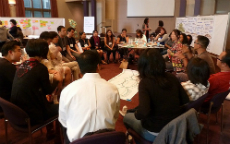Vincent Pan, Executive Director, Chinese for Affirmative Action
When we consider change, our mindset is typically to reflect upon the past and then imagine a different future. This is a necessary approach, but it is rarely enough.
Instead, sustainable change requires us to look inwards – at our own beliefs, biases, and behaviors – so that we critique and transform our whole way of being.
In many respects, this is the true challenge of capacity building. How do we, as individuals and as institutions, intentionally shape our own evolution even as we attempt to shape the evolution of our communities? How do we do this to achieve a more wholehearted and healthy version of ourselves?
The three years that Chinese for Affirmative Action (CAA) participated in the National Gender & Equity Campaign (NGEC) was part of our attempt to answer these questions. Through philosophy and through practice (and more practice) we sought to improve how we understand and live our commitment to gender democracy, gender equity, and gender justice.
At times, even plans were profound. For example, re-organizing our offices to be more physically open encouraged sharing space and subsequently power. The creation of unexpected teams across work areas, and the rotation of responsibilities within teams, broadened our perspectives and deepened our empathy for one another.
Those steps were part and parcel, and precursor, to the explicit address of gender. In many ways, gender equity became both a means and an ends. It was an open challenge as each insight spawned exponentially more pathways to pursue. Each measure of growth revealed more horizons to explore. I can better see the pursuit of gender equity as a living, breathing process that must continually surface and resurface in our politics, in our policies, in our programs, in the lives of those who participate in and with our efforts.
Today we live in a time of great danger. Recorded poverty in America has never been higher even as our capacity for materialism surges unbounded. Two wars abroad and the domestic war on our civil liberties drain our moral and financial reserves. Fundamentalists exploit the lack of a coherent system of ethics in our country to further divide and oppress people using class, color, gender, and identity.
Yet it is also a time of great hope. A new generation of activists has within its grasp the ability to achieve a new universal consciousness. It is a consciousness that does not circumvent or freeze identity, but instead marches with it towards social justice. It is consciousness based on love and compassion, and on fairness and freedom. It is a consciousness that asks what it means to be a human being in the twenty-first century.
Ultimately, this campaign was about us re-engineering our DNA. This is as it should be, because only by transforming ourselves, as deeply and inwardly as possible, and as individuals and as institutions, can we begin to create the consciousness and fulfill the hopefulness these difficult times demand.

